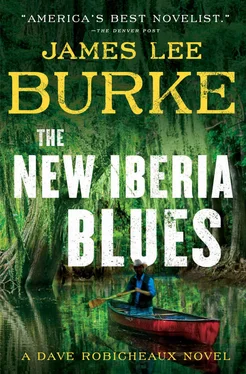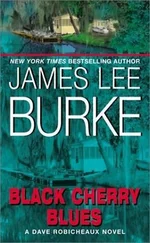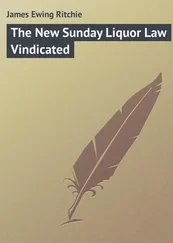James Lee Burke
The New Iberia Blues
For Julian Higgins, a poet with a movie camera
Desmond Cormier’s success story was an improbable one, even among the many self-congratulatory rags-to-riches tales we tell ourselves in the ongoing saga of our green republic, one that is forever changing yet forever the same, a saga that also includes the graves of Shiloh and cinders from aboriginal villages. That is not meant to be a cynical statement. Desmond’s story was a piece of Americana, assuring us that wealth and a magical kingdom are available to the least of us, provided we do not awaken our own penchant for breaking our heroes on a medieval wheel and revising them later, safely downwind from history.
Desmond was not only born to privation, in the sleeper of a semi in which his mother tied off the umbilical cord and said goodbye forever; he was nurtured by his impoverished grandparents on the Chitimacha Indian Reservation in the back room of a general store that was hardly more than an airless shack. It stood on a dirt road amid treeless farmland where shade and a cold soda pop on the store gallery were considered luxuries, before the casino operators from Jersey arrived and, with the help of the state of Louisiana, convinced large numbers of people that a vice is a virtue.
Like his grandparents, he belonged to that group of mixed-blood Indians unkindly called redbones. His hair was cinnamon-colored, more a characteristic of Cajun women than of men. His skin was as smooth as clay, almost hairless, his eyes a washed-out blue and set too wide, like those of someone with fetal alcohol syndrome. He was self-conscious about his racial background, as most of his people were, and smiled rarely, but when he did, he could light a room. I always had the sense that Desmond was trying to shrink inside his clothes, as though both fear and a great sadness lived inside him. Like Proteus blowing his wreathed horn, Desmond constantly created and re-created himself, perhaps never knowing who he was.
No matter. Even as a little boy, he was not one to accept the world as it was, no more than he would accept the hand he’d been dealt. By the time he was twelve, he seemed destined to remain skinny and frail and a carrier of intestinal worms and head lice. One morning, behind his grandparents’ general store, bare-chested under a white sun, his little body running with sweat, he roped a cinder block to each end of a broom handle and lifted. And kept lifting. And squeezing a rubber ball silently on the school bus while the bigger boys laughed at him and often pushed him down on the gravel. By the time he was fourteen, he had the body and the latent animus of a man, and the boys who had bullied him now tried to ingratiate themselves with a weak, self-deprecating smile. He responded with the benign attention of someone watching a stranger blow soap bubbles, until they bowed their heads and went silent, lest they provoke him.
After high school, he waited tables in the French Quarter and became an apprentice to a sidewalk artist in Jackson Square, and discovered that he was better than his teacher. Sometimes I would see him in the early a.m., disheveled, paint on his shirt and in his hair, eating beignets out of a paper bag and drinking café au lait from a Styrofoam cup. On a particularly cold and gray January morning, I saw him hunched on an iron bench inside the fog by St. Louis Cathedral, like an unevolved creature from an earlier time. He was not wearing a coat and his sleeves were rolled high up on his arms, as though in defiance of the weather. He seemed melancholy, his insouciance a pretense for his loneliness, and I sat down beside him without being invited. The air smelled of the river, dead beetles in a storm sewer, the wine and beer cups in the gutters, damp soil and night-blooming flowers and lichen on stone. It was a smell like a Caribbean city rather than America. He told me he was going to Hollywood so he could become a film director.
“Don’t you have to study to do that?” I said.
“I already have,” he replied.
“Where?”
He pointed a finger to his head. “In here.”
I grinned good-naturedly but didn’t speak.
“Don’t believe me, huh?” he said.
“What do I know?”
“You still go to Mass?” he said.
“Sure.”
“That means you believe in the things that are on the other side of the physical world. That’s what painting is. That’s what making movies is. You enter a magical world others have no knowledge of.”
I got up from the bench. I felt old. My war wounds ached. The hardness of the bench was printed on my buttocks. I heard the Angelus ringing in the cathedral’s tower, perhaps as a reminder of our mutability and ultimate fate.
“Good luck,” I said. “Kick some butt in California.”
There was a smear of powdered sugar on his cheek. For just a moment I thought of a pauper child who might have ferreted his way into a bakery. He was smiling when he looked up at me.
“What’s the joke?” I asked.
“Anything you get with luck isn’t worth owning, Dave. I thought you knew that.”
Twenty-five years later, Desmond came home a director, with a Golden Globe Award and an Academy Award nomination. He took up part-time residence in a house on stilts down at Cypremort Point, with oaks and palm trees in the yard and a magnificent view of the bay, where each evening he claimed to see sharks gliding out of the sunset, dipping in the swells, their dorsal fins as etched as broken razor blades. The problem was, nobody else saw them. A long time ago everyone had decided Desmond was not quite of this earth and lived on the edge of a dream from which he derived both his art and his apparent contempt for success and money.
He didn’t fit into a categorical shoe box and, consequently, got into trouble with everyone — producers, the politically correct and the non — politically correct, an actor he tossed into a swimming pool, an Arab sheik who kept a dozen automobiles idling twenty-four hours a day in the garage of the Beverly Hills Hotel and to whose cottage Desmond delivered a truckload of goats.
On the burnt-out end of an August afternoon, following a summer of drought and fish kills and dried-out marshland that was turning to ceramic, I drove down to the tip of Cypremort Point with a young uniformed deputy named Sean McClain, who had seven months’ experience in law enforcement and still believed in the human race and woke up each day with birdsong in his head. He had been raised in a small town on the Louisiana — Arkansas line and had an accent like someone twanging a bobby pin.
At five a.m. the same day, we had received three 911 calls about a woman screaming from somewhere at the southern end of the Point. One caller said the scream came from a lighted cabin cruiser. The other callers were unsure. The sun was up when the responding deputy arrived. Nobody at the docks or boathouses had heard or seen anything unusual. I could have written the entire incident off, but any time three people report a scream, they’re calling not about a sound but about a memory that lives in the collective unconscious, one that goes back to the cave. When we are alarmed to the degree that we have to tell others about it, we’re dipping into a primal knowledge about the darker potential of the gene pool. Or at least this has always been my belief.
I pointed out Desmond’s house to Sean.
“That’s where that famous movie guy lives at?” he said. “That’s something else, isn’t it?” I’m sure what he said contained a message, but I had no idea what it was.
“Yep, that’s where he lives part of the year,” I said.
“Is he one of them Hollywood liberals?”
Читать дальше












